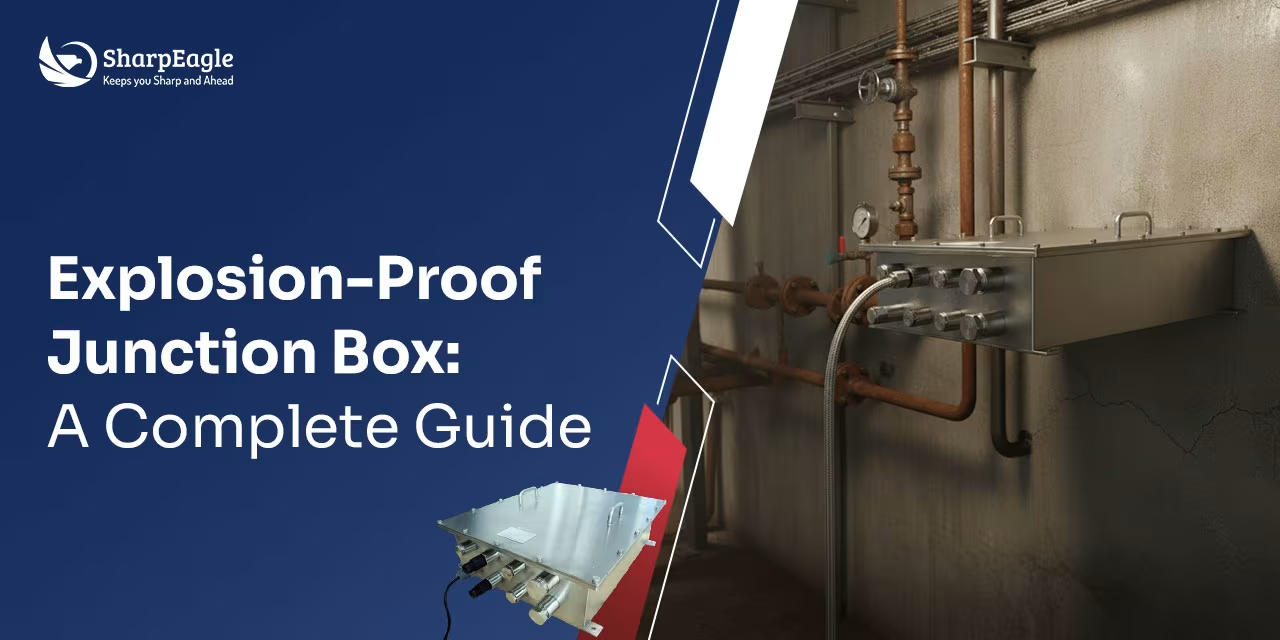

An industry having security and safety as top priorities must have reliable CCTV solutions.
Ensuring a safe work environment and averting accidents, injuries, and equipment damage necessitates the ability to monitor and manage activities, applications, and processes.
However, in some industries, the presence of hazardous environments, dangerous situations, and possibly deadly risks of fires and explosions increases the requirement for a trustworthy surveillance and security system.
This article examines the reasons why you should use industrial CCTV cameras in your warehouse. You may also learn about the specifications and guidelines for CCTV systems in explosive environments and dangerous locations (EX zones).
In high-risk industrial settings, think chemical plants in the UK, oil fields in Saudi Arabia, or desert logistics hubs in the UAE, threats to safety and security are unpredictable. Industrial CCTV cameras provide more than just video; they offer a vigilant eye that helps prevent accidents, deter theft, and ensure regulatory compliance. In 2025, investing smartly in surveillance isn’t just about watching it's about staying ahead

In high-risk industrial settings, think chemical plants in the UK, oil fields in Saudi Arabia, or desert logistics hubs in the UAE, threats to safety and security are unpredictable. Industrial CCTV cameras provide more than just video; they offer a vigilant eye that helps prevent accidents, deter theft, and ensure regulatory compliance. In 2025, investing smartly in surveillance isn’t just about watching it's about staying ahead.
Industrial CCTV cameras are necessary for monitoring high-risk environments like oil and gas facilities. These cameras are designed to withstand extreme conditions, including toxic gases and high temperatures, ensuring reliable surveillance in volatile environments. Hazardous area cameras are crucial in maintaining safety and security in remote industrial sites, where human presence is limited. By providing continuous monitoring, these surveillance systems mitigate risks and enhance workplace safety. Investing in industrial CCTV cameras is essential for safeguarding assets and personnel in hazardous industries, contributing to overall risk management and operational efficiency.
According to one of the recent Research Gate publications, implementing a visual recording system in the workplace offers promising results in enhancing safety management, particularly in manufacturing settings. A recent experiment conducted in an Italian heat treatment company validates the efficacy of video surveillance in identifying risks associated with unsafe behaviours and environmental conditions. Unlike in-person observations, video technology provides unbiased accident data, allows for in-depth analysis, and eliminates the risk of observers being exposed to hazards. Moreover, recorded videos enable continuous monitoring, facilitating the identification of safe practices and enhancing risk management strategies. While further investigation is needed to evaluate long-term effectiveness, the initial findings underscore the potential of video surveillance systems in improving worker safety and mitigating workplace hazards.
One of the Research Gate’s Publications shows that the integration of CCTV cameras in construction projects is emerging as a strategic tool for enhancing operational efficiency and productivity. These cameras serve multifaceted roles, from deterring theft and vandalism to monitoring project progress and identifying potential hazards. By acting as a deterrent, CCTV cameras contribute to a secure environment, minimising disruptions and ensuring monitoring of construction activities remotely constraints. Additionally, they enable project managers to monitor construction activities remotely, facilitating proactive intervention and optimization of workflows. Moreover, the surveillance capability of CCTV cameras aids in reducing accidents and injuries by promptly identifying safety hazards. However, it's imperative to adhere to legal and ethical considerations to safeguard privacy rights while harnessing the benefits of CCTV surveillance. Overall, the appropriate use of CCTV cameras fosters streamlined operations, enhances productivity, and upholds safety standards in construction endeavours.
Incorporating industrial CCTV cameras into warehouse operations offers enhanced security, accident prevention, and operational efficiency. With real-time surveillance and advanced analytics, these cameras deter theft, mitigate risks, and optimise processes. CCTV cameras streamline surveillance, while cloud-based storage enables remote monitoring. Cost savings come from reduced manual guarding, optimised energy consumption, and improved inventory management. Ultimately, the implementation yields a significant return on investment (ROI) by safeguarding assets, minimising losses, and enhancing overall profitability.
Using CCTV cameras in hazardous industries like oil and gas, construction, logistics, etc. can enhance compliance with legal regulations and provide legal protection in several ways:
Advanced technology in CCTV cameras greatly enhances safety and surveillance in hazardous industries:
While selecting the right CCTV cameras, there are several factors to consider if you want to install a CCTV video surveillance system at your business. Before choosing the cameras that best meet your demands, you should consider the following important factors:
1. Lens Selection:
2. Sensor Consideration:
3. Output Resolution Evaluation:
4. CCTV Camera Types:
Contact us for a consultation for personalised guidance on selecting the most suitable CCTV cameras for your industrial needs.
To conclude, CCTV cameras have various use cases for a hazardous industry environment. Upon installing CCTV cameras from reliable and well-established companies like SharpEagle, you can boost productivity by mitigating risk, monitoring employees' work progress, adhering to the safety guidelines provided by OSHA, and more.
The benefits of incorporating CCTV cameras in your warehouse/ industry are endless. So if you want to safeguard your hazardous workplace and skyrocket production, you should immediately contact SharpEagle is a leading end-to-end safety solution provider. From CCTV cameras to safety lights, SharpEagle has a solution for every need. SharpEagle’s safety solutions are ATEX-certified and built by zone and temperature classification with stainless steel to fit every type of industry.
Are standard CCTV cameras enough for hazardous industrial zones?
No, in areas with flammable gases, dust, or explosion-risk, you need specially certified (ATEX / IECEx) rugged and explosion-proof cameras.
How does CCTV help with regulatory compliance in UAE / Saudi Arabia?
It provides evidence for audits, tracks safety practices, documents hazard mitigation, and helps meet requirements set by UAE EHS / GSO / ESMA and Saudi SASO / SABER.
What features matter most in industrial CCTV for harsh climates (like deserts)?
High IP rating, corrosion-resistant materials, temperature tolerance, protection from sand/dust ingress, and consistent power / remote access.
Can industrial CCTV reduce operational costs?
Yes, via reduced theft/vandalism, early detection of equipment issues, less manual surveillance needed, lower liability costs.



